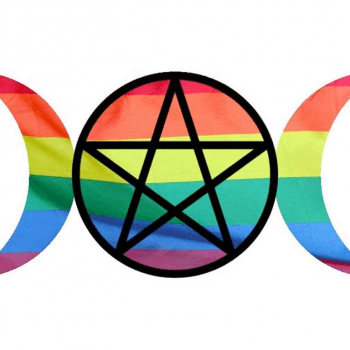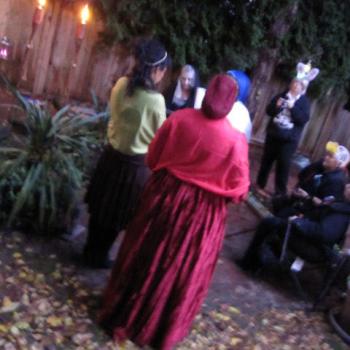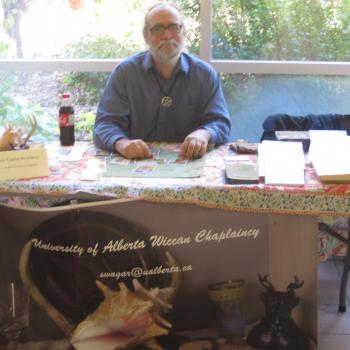
For activities in the Pagan communities to happen, someone must organize them. Someone must pick up the phone and book the meeting space (park or community centre), they must put out publicity, they must directly contact and organize a team of volunteers to help set up before the event, perform the ritual or activity, and clean up and clear out afterward. Someone must pull together the initial cash to pay the rent or deposit, buy supplies, and then collect registration fees and donations. Someone must set up the bank account, keep track of the money and the list of volunteers and people in attendance.
A lot of little details, most of which are not that time consuming, but all of which really need to be looked after for events to be successful. If you want to do more than just one event, anyhow.
You might think this is obvious and wonder why I even mention this. Because we need to ask – who is it that does this work? Why? Who are they responsible to make sure it gets done well, or that it happens at all? How can we make more things happen, and more complicated, deeper, long-term things as well? How do we get organized?
The growth in the Pagan communities has slowed down, and there is discussion about where we might go from here. I think that we are reaching the limits of how much we can get done by relying primarily on ad-hoc organization by small groups of friends.

There has been a great emphasis on solitary practitioners of Wicca and on informal community groups. The Witchcraft and neo-Pagan folk culture centred on occasional community rituals and festival religious retreats is vibrant and lively. Where a large neo-Pagan movement exists, people connected to it can readily come together in community celebrations. For the early development of the movement outside of the covens this was wholly positive – it was focused on the most basic reclaiming and rediscovery of the Goddess and the informal moon group and community Open Circle were excellent means to this end. The looseness and informality encouraged participation in discussion and the often-supportive atmosphere elicited personal insight.
The weaknesses in this approach don’t appear until the virtue of general foundation work is exhausted and people and groups want to do something more specific. Most groups are unwilling to change their structure when they change their task, so when people tire of lowest-common denominator and want to do something more, they collapse. Informal groups can get people to dance and chant and talk about their lives, but they aren’t very good for getting deeper into the spirit, developing theology and a way of life based on religion, nor nourishing leadership.
If we are to move beyond these elementary stages of development, we will have to get rid of prejudices about organization and structure. There is nothing inherently bad about either of these. By rejecting them out of hand because they are sometimes misused we deny ourselves necessary tools for further development.
Organization and leadership growth of formal Temple groups, whose rites and services are available to the general public, which have regular scheduled meetings and formally recognized and responsible clergy, must include adapting ideas from other sources, filtered through our theology from a Wiccan foundation, needs and sensibility. Frankly, the methods that we have used to build Temples (to the extent that any word as systematic as “method” is appropriate) have been ineffective.
Most Temples have functioned as Outer Court student groups and recruitment pools of covens or as private projects of individuals. They do not necessarily reflect the needs or priorities of the communities that they serve because they are not rooted there. They need not be responsible to them nor even to the people who participate in and support their activities financially or with their labour. Their leadership is inconsistent in training, with great gaping holes in their skills, inadequate theoretical bases, theological and organizational understanding, chosen by friendship or affiliation to the founders of the project instead of on rational spiritual and leadership criteria.

This hobbyist model can produce short-lived experiments and groups but is limited by the enthusiasm and resources of the group founders. The groups generally do not plan to transition to new leaders when the founders quit or die, so mentorship is ad-hoc and inconsistent, and they are competitive and uncooperative with each other. Long range planning is absent, record keeping of any sort is minimal and inadequate – they are run as hobbies, not as serious religious bodies and organizations. They are not a good foundation to a religious movement or community.
We need to organize ourselves to identify and accomplish the tasks ahead of us, the functions that our groups fulfill, rather than be based on ideological preconditions. What we need to do in finding and telling our story is to listen to the Gods, to the needs and experiences of the people around us, to look at how similar things have been done by others, and to trust our processes. We must begin with the needs of the religion, and of the people that we serve in our communities, and not with the needs of the founders and leaders of our organizations.
In many ways, those best suited to be spiritual leaders and the inspirational originators of groups are very poorly suited to administration or to continuing those groups. We need to value and nurture different leadership skills, including management skills. In the same way, there cannot be only one type of spiritual leadership valued in our religion- different needs exist and different means to satisfy them as well.
The base line theological agreements of our movement; that we are polytheists who see the divine as both female and male; that women and men, gay or straight, are all capable of embodying the divine and acting as clergy; that pleasure and the joys of life are routes to the divine and deeply meaningful, not delusions or blind alleys leading us away from understanding; that magic works and on the underlying truths of the mystical path; these ideas are worth engaging with and building an organization around. The organizational principles of congregationalism and internal democracy, Priesthood that are responsible to the organization as a whole and to the service of particular congregations, these are also good, balancing flexibility, adaptability, and the capacity to work together toward our common goals.













